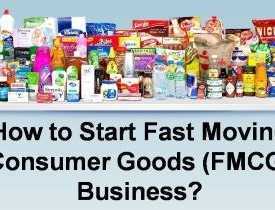Description
Course Name: Certificate in Fast Moving Consumer Goods(FMCG)
Course Id: CFMCG/Q1001.
Eligibility: 10th Grade(High School) or Equivalent.
Duration: One Month.
Objective: The objective of this course is to provide learners with comprehensive knowledge and practical skills related to the production, marketing, distribution, and management of FMCG products. The course covers supply chain logistics, consumer behavior, branding, quality control, and sales strategies, preparing participants for effective roles in the fast-paced FMCG sector.






Debit/Credit Card, Wallet, Paytm, Net Banking, UPI, or Google Pay.



• A soft copy (scanned) of your certificate via email within 7 days of examination.
• A hard copy (original with official seal and signature) sent to your address within 45 day of declaration of result.

Online Examination Detail:
Duration- 60 minutes.
No. of Questions- 30. (Multiple Choice Questions).
Maximum Marks- 100, Passing Marks- 40%.
There is no negative marking in this module.
| Marking System: | ||||||
| S.No. | No. of Questions | Marks Each Question | Total Marks | |||
| 1 | 10 | 5 | 50 | |||
| 2 | 5 | 4 | 20 | |||
| 3 | 5 | 3 | 15 | |||
| 4 | 5 | 2 | 10 | |||
| 5 | 5 | 1 | 5 | |||
| 30 | 100 | |||||
| How Students will be Graded: | ||||||
| S.No. | Marks | Grade | ||||
| 1 | 91-100 | O (Outstanding) | ||||
| 2 | 81-90 | A+ (Excellent) | ||||
| 3 | 71-80 | A (Very Good) | ||||
| 4 | 61-70 | B (Good) | ||||
| 5 | 51-60 | C (Average) | ||||
| 6 | 40-50 | P (Pass) | ||||
| 7 | 0-40 | F (Fail) | ||||







Syllabus
Introduction to FMCG Sector: Definition and characteristics of FMCG, Categories of FMCG products, Role of FMCG in the economy, Overview of Indian and global FMCG markets, Key players and brands in the industry, Consumer behavior in FMCG, Regulatory environment for FMCG, Importance of packaging and branding, Demand drivers and trends in FMCG, Scope for employment and entrepreneurship.
Product Development and Innovation: Stages of product development, Idea generation and feasibility analysis, Formulation and design of FMCG products, Role of R&D in FMCG innovation, Packaging development and design considerations, Use of sustainable and eco-friendly materials, Product differentiation strategies, Sensory evaluation and consumer testing, Costing and pricing strategies, Launching new products in the market.
Manufacturing and Operations: Types of FMCG production units, Production planning and control, Raw material procurement and inventory management, Equipment and machinery used in FMCG manufacturing, Quality assurance and control processes, Lean manufacturing in FMCG, Waste management and sustainability, Hygiene and safety standards, Automation and technology in FMCG production, Standard Operating Procedures (SOPs).
Marketing and Branding: Understanding FMCG consumer needs, Branding strategies and identity creation, Role of advertising and media, Promotions and loyalty programs, Digital marketing for FMCG products, Market segmentation and targeting, Packaging as a marketing tool, Product positioning and pricing, Distribution of promotional materials, Case studies of successful FMCG marketing campaigns.
Sales and Distribution Management: Types of FMCG sales channels, Distributor and retailer network setup, Supply chain and logistics management, Role of sales representatives and field executives, Sales forecasting and planning, Route planning and beat management, Relationship management with trade partners, Performance tracking and reporting, Sales incentives and schemes, Challenges in FMCG distribution.
Retail and E-Commerce in FMCG: Modern trade vs traditional trade, Retail shelf management, Supermarket and convenience store operations, Product visibility and merchandising, Role of planograms and display design, Online retailing and marketplaces, FMCG in D2C (Direct to Consumer) model, E-commerce order processing and fulfillment, Customer experience and reviews management, Omnichannel strategies.
After successful completion of the Certificate in Fast Moving Consumer Goods (FMCG) program, graduates gain essential knowledge and skills related to the production, marketing, sales, and distribution of FMCG products such as food, personal care, household items, and more. The FMCG sector is one of the largest and fastest-growing industries in India, offering diverse career opportunities.
✅ Career Options After Certificate in FMCG – India
| Job Role | Job Description | Average Salary Range (per annum) |
|---|---|---|
| Sales Executive / Sales Representative | Promotes and sells FMCG products to retailers, wholesalers, and distributors. | ₹2.5 – ₹5.0 Lakh + incentives |
| Brand Promoter / Merchandiser | Ensures FMCG products are well-displayed and promoted at retail outlets to boost sales. | ₹1.8 – ₹3.5 Lakh |
| Marketing Assistant | Supports marketing campaigns, market research, and product launches. | ₹2.0 – ₹4.5 Lakh |
| Supply Chain Assistant | Assists in inventory management, logistics, and distribution of FMCG products. | ₹2.0 – ₹4.0 Lakh |
| Quality Control Analyst | Tests FMCG products to ensure they meet safety and quality standards. | ₹2.5 – ₹4.5 Lakh |
| Production Supervisor (FMCG Manufacturing) | Oversees manufacturing processes to ensure timely production and quality control. | ₹3.0 – ₹5.5 Lakh |
| Retail Store Manager (FMCG outlets) | Manages retail outlets that sell FMCG products, ensuring sales targets and customer satisfaction. | ₹3.0 – ₹6.0 Lakh |
| Entrepreneur – FMCG Distribution / Retail Business | Starts small to medium FMCG distribution or retail business. | ₹5 – ₹20+ Lakh (profit-dependent) |
🛒 Industries Employing Graduates
-
FMCG manufacturing companies (e.g., Hindustan Unilever, ITC, Nestlé)
-
Retail chains and supermarkets
-
Wholesale and distribution companies
-
Marketing and advertising agencies
-
Quality control laboratories
-
E-commerce FMCG platforms
💼 Entrepreneurial Opportunities
Graduates can:
-
Launch small-scale FMCG retail shops or kiosks in local markets.
-
Become distributors or wholesalers for FMCG brands.
-
Start home-based packaging or labeling units for FMCG products.
-
Provide marketing and promotional services for new FMCG brands.
💰 Earnings Potential:
-
Small retail or distribution business: ₹30,000 – ₹1 lakh/month profit
-
Medium-scale FMCG business: ₹8 – ₹30+ Lakh per annum

